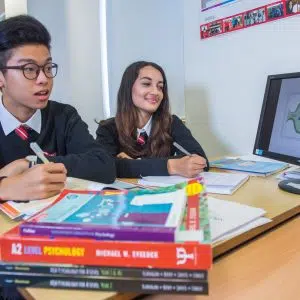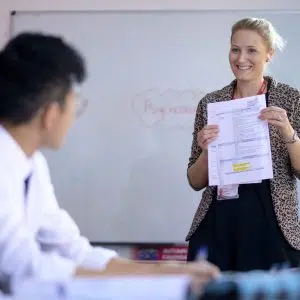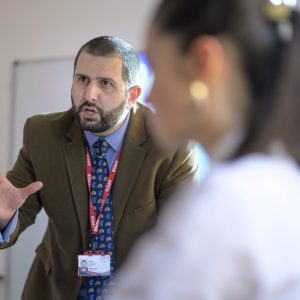Cambridge A Levels
BIOLOGY
Exam Board: Eduqas (WJEC)
Staff: Dr Julian Davies (Head)
Summary: A two-year A level course examined at the end of Year 13. Students also sit exams at the end of year 12 for the standalone AS level qualification.
What do I need to know or be able to do before taking Biology?
You will need to get at least a grade 8 (or A) in both: Biology GCSE/ IGCSE and Chemistry GCSE/ IGCSE. Students will be expected to interpret and process results which will involve plotting graphs and the use of statistical analysis and therefore it is desirable for students to have achieved a grade 8 (A) or above in Mathematics GCSE/ IGCSE.
What will I learn?
Students will be able to:
-
Acquire an in-depth knowledge of the biological world and gain an appreciation of its significance
-
Develop a respect for all living things and an understanding of their interaction and functions
-
Develop experimental skills including use of the microscope and slide preparation, dissection, chromatography and many biochemical procedures
-
Develop an understanding of scientific method including controlling variables, statistical analysis and evaluation of results
EDUQAS Specification content:
-
Basic Biochemistry and Cell Organisation (including Nucleic acids and introductory Genetics)
-
Biodiversity and Physiology of Body Systems (including gas exchange and circulatory systems)
-
Energy, Homeostasis and the Environment (including the Nervous System and Kidney function)
-
Variation, Inheritance and Immunology (including application of reproduction and genetics)
-
Practical Skills (including investigation, analysis and evaluation of experimental data)
What examinations will I have to take?
The standalone AS-level qualification
There are two theory examination papers at the end of year 12. These examine all AS work and result in a standalone AS qualification. The results obtained are not included in the full A-level exam papers that are sat at the end of year 13. The AS exams are:
Component 1: Basic Biochemistry and Cell Organisation (75 marks, 1 hour 30 minutes)
Component 2: Biodiversity and Physiology of Body Systems (75 marks, 1 hour 30 minutes)
The final AS-level grade comprises the total marks obtained in the two papers (maximum 150 marks).
The full A-level qualification
Students sit exam papers in three components at the end of year 13. All of the subject material from year 12 and year 13 is examined. Results from AS-level exams are not included in the A-level qualification.
Component 1: Energy for Life (2 hours, 100 marks)
Component 2: Continuity of Life (2 hours, 100 marks)
Component 3: Requirements for Life (2 hours, 100 marks)
The final A-level grade comprises the total marks obtained in the three papers (maximum 300 marks).
Practical skills
Practical skills for both AS and A-level are assessed internally where a student will be assessed on their (i) practical skills, during a number of separate experimental tasks and (ii) written skills, to include graphs, statistical analysis of data and evaluation. Practical skills do not contribute any marks to the overall AS or A-level grade but students must obtain a minimum competence in order to qualify for either qualification.
Field Trip
As an integral part of the course, we take students out on a fieldtrip for up to four days at the beginning of their second A2 year. This is so students can learn critical ecological practical skills which they cannot be taught within the classroom and enable them to apply key statistical analysis whilst interacting and experiencing first-hand key ecological interactions.
What could I go on to do at the end of my course?
– Follow a degree course in Biology, Biochemistry, Zoology, Microbiology, Marine Biology, Plant Science, Genetics, Medicine, Dentistry, Nursing, Agriculture and Forestry, Psychology, Pharmacy etc.
– Biology as a science discipline is a useful addition to the list of subjects read predominately by Arts or Humanities based students. It demonstrates the ability to think logically and to present or evaluate data
CHEMISTRY
Examination Board: Eduqas (WJEC)
Staff: Sarah-Jane Hilton
Summary: A two-year Advanced Level course examined at the end of Year 13
What do I need to know or be able to do before taking Chemistry?
The specification builds on the knowledge, understanding and skills set out in the WJEC GCSE criteria/content for Science. Skills in Numeracy/Mathematics, Literacy/English and Information Communication Technology will provide a good basis for progression to this qualification. Students will be expected to be able to process and analyse the results of experimental work which will include graph plotting and numerical manipulation.
What will I learn?
– Acquire a body of chemical knowledge and an appreciation of its significance
– Use theories, models and ideas to develop scientific explanations
– Use knowledge and understanding to pose scientific questions, define scientific problems, present scientific arguments and scientific ideas
– Use appropriate methodology, to answer scientific questions and solve scientific problems
– Practical work is an intrinsic part of this specification. It is vitally important in developing a conceptual understanding of many topics and it enhances the experience and enjoyment of chemistry. The practical skills developed are also fundamentally important to learners going on to further study in Chemistry and related subjects, and are transferable to many careers.
Specification Content:
AS UNIT 1: The Language of Chemistry, Structure of Matter and Simple Reactions
AS UNIT 2: Energy, Kinetics and Carbon Chemistry
AS UNIT 3: Physical and Inorganic Chemistry
AS UNIT 4: Organic Chemistry and Analysis
AS UNIT 5: Practical Chemistry
What examinations will I Have to take to get my qualification?
There are two theory exam papers at the end of year 12. These examine all AS work and result in a standalone AS qualification. The results obtained are not included in the full A-level exam papers that are sat at the end of year 13. The AS exams are:
Component 1: The Language of Chemistry, Structure of Matter and Simple Reactions (80 marks, 1 hour 30 minutes)
Component 2: Energy, Rate and Chemistry of Carbon Compounds (80 marks, 1 hour 30 minutes)
The full A-level qualification
Students sit exam papers in three components at the end of year 13. All of the subject material from year 12 and year 13 is examined. Results from AS-level exams are not included in the A-level qualification.
Component 1: Physical and Inorganic Chemistry (120 marks, 2 hours 30 minutes)
Component 2: Organic Chemistry and Analysis (120 marks, 2 hours 30 minutes)
Component 3: Chemistry in Practice (60 marks, 1 hour 15 minutes)
The final A-level grade comprises the total marks obtained in the three papers.
Practical skills
Practical skills for both AS and A-level are assessed internally where a student will be assessed on their (i) practical skills during a number of separate experimental tasks and (ii) written skills, to include graphs, statistical analysis of data and evaluation. Practical skills do not contribute any marks to the overall AS or A-level grade, but students must obtain a minimum competence in order to qualify for either qualification.
What could I go on to do at the end of my course?
A Level Chemistry provides the required foundation for the study of Chemistry in Higher Education, including Chemistry at degree level and in related areas such as Medicine, Biochemistry, Veterinary Science, Pharmacy, Material Science, Metallurgy, Dentistry and Chemical Engineering.
The course also allows students to develop knowledge and an array of transferable skills essential for direct entry into employment in many Chemistry related and other scientific and non-scientific fields.
COMPUTER SCIENCE
Exam Board: AQA
Staff: Dr Jem Pearson and Mr Rob Stuart
Summary of Course: A one year AS Level course examined at the end of Year 12 and a two year A Level course, examined at the end of Year 13.
What do I need to know or be able to do before taking Computer Science at A Level?
You will need to have good logical thinking and problem-solving skills to succeed in this course. We do not require any programming experience but if you have done GCSE Computer Science or any programming before, that will put you in good stead.
What will I learn?
You will learn about the important computer hardware components and how these interact with software to carry out all the instructions, how to develop new software to solve problems. You will do this by analysing problems, designing algorithms and writing programs to implement the algorithms.
You will also learn about the impact of computer science on society by looking at the economic, moral, legal, ethical and cultural issues relating to computer science.
What examinations will I Have to take to get my qualification?
The standalone AS-level qualification
There are two exam papers at the end of year 12. These examine all AS work and result in a standalone AS qualification. The results obtained are not included in the full A-level exam papers that are sat at the end of year 13. The AS exams are:
Component 1: Fundamentals of Computer Science. Written examination: 2 hours, 70% of qualification
This component investigates computer architecture, communication, data representation, data structures, software applications, programs, algorithms, logic, programming methodologies and the impact of computer science on society.
Component 2: Practical Programming to solve problems. On-screen examination: 2 hours 15 minutes, 30% of qualification
This component consists of a series of set tasks completed on-screen by candidates. These tasks will assess the practical application of knowledge and understanding and will require the use of Visual Basic.NET, Python or Java as a programming language. We teach the Python language at CSFCC.
The full A-level qualification
Students sit exam papers in three components at the end of year 13. All of the subject material from year 12 and year 13 is examined. Results from AS-level exams are not included in the A-level qualification.
Component 1: Programming and System Development. Written examination: 2 hours 45 minutes. 40% of qualification
This component investigates programs, data structures, algorithms, logic, programming methodologies and the impact of computer science on society.
Component 2: Computer Architecture, Data, Communication and Applications. Written examination: 2 hours 45 minutes. 40% of qualification
This component investigates computer architecture, communication, data representation, organisation and structure of data, programs, algorithms and software applications.
Component 3: Programmed Solution to a Problem. Non-exam Assessment. 20% of qualification
Candidates discuss, investigate, design, prototype, refine and implement, test and evaluate a computerised solution to a problem chosen by the candidate which must be solved using original code (programming). This is a substantial piece of work, undertaken over an extended period of time.
The final A-level grade comprises the total marks obtained in the three papers.
What could I go on to do at the end of my course?
Computer Science impacts many areas of other sciences as well as many aspects of our lives. A greater understanding of computer systems will enable you to develop new solutions to problems, be aware of the strengths and limitations of computer applications, be more proficient in incorporating computer-based solutions into the problems you may encounter in your professional and everyday lives.
Students who finish the A level Computer Science courses often progress into careers in Engineering, STEM subjects as well as Social Sciences that use statistical programming software to analyse data.
Competitions
Students will be entering various computing related competitions including
Bebras Computing Challenge
OUCC(Oxford University Computing Challenge)
British Informatics Olympiad
ECONOMICS
Exam Board: Eduqas (WJEC)
Staff: Girish Menon
Summary of Course: A one year AS Level course, examined at the end of Year 12 and a two year A Level course examined at the end of Year 13
What do I need to know or be able to do before taking Economics?
There is no requirement to have studied Economics before but students are expected to have at least an A grade in Mathematics GCSE and a B grade (or equivalent) in English Language GCSE. The examination papers are designed to test the interpretation and explanation of economic theories in the context of numeracy and written skills.
The Eduqas A level in Economics encourages learners to:
-
Appreciate the contribution of Economics to the understanding of the wider economic and social environment
-
Develop an understanding of a range of concepts and an ability to use those concepts in a variety of different contexts
-
Use an enquiring, critical and thoughtful approach to the study of economics and develop an ability to think as an economist
-
Develop analytical and quantitative skills, together with qualities and attitudes which will equip them for the challenges, opportunities and responsibilities of adult and working life
Main Topic themes will include:
-
Markets – the concept of Demand and Supply
-
Market Failure
-
Macro-Economic Policy- Fiscal & Monetary Policy
-
International Trade and Exchange Rates
-
Market Structures
-
Macro-Economic Objectives – Employment, Inflation, Economic Growth
-
International Institutions, Globalisation and Development Economics
Specification Content:
There are two theory exam papers at the end of year 12. These examine all AS work and result in a standalone AS qualification. The results obtained are not included in the full A-level exam papers that are sat at the end of year 13. The AS exams are:
Component 1: Introduction to Economic Principles. (60 marks, 1 hour, 40% of qualification)
Component 2: Exploring Economic Issues (80 marks, 2 hours, 60%of qualification)
The final AS-level grade comprises the total marks obtained in the two papers (maximum 140 marks).
The subject content for A level Economics will be assessed across three examination papers.
Component 1: Economic Principles Written examination: 1 hour 30 minutes 30% of qualification
Component 2: Exploring Economic Behaviour Written examination: 2 hours 30 minutes 30% of qualification
Component 3: Evaluating Economic Models and Policies Written examination: 2 hours 30 minutes 40% of qualification
The subject content has been grouped into three broad areas of study: · Microeconomics · Macroeconomics · Trade and development.
What kind of student is the course suitable for?
-
Students who have an interest in current affairs
-
Students who enjoy relating theory to real world situations
-
Students who are interested in how different economies function
-
Students who have an interest in careers within financial services and government based economic agencies
-
Students who want to use economics to support other qualifications such as maths, Sciences, Government and Politics, Geography, History and Psychology
What could I go on to do at the end of my course?
A Level Economics is highly regarded amongst academic circles as well as in employment. The full A Level in Economics provides the basis for students who wish to proceed to Higher Education to study Law, Business Management, Marketing, Accountancy, Finance and Banking.
FURTHER MATHEMATICS
Exam Board: Edexcel
Staff: Robert Stuart
Summary: A linear two year A Level course, examined at the end of both Year 12 (AS Level) and Year 13 (A Level)
What do I need to know before taking Further Maths at A Level?
You will need to get at least a Grade 8 (preferably a Grade 9) in Mathematics GCSE (or equivalent). Effective communication in English will also be required. You will require a Casio FX991EX Classwiz Advanced Scientific Calculator for this course. Please note that simultaneous study of A Level Mathematics is a requirement for study of A Level Further Mathematics..
What will I learn?
Further Mathematics is a distinguished subject, requiring not just a great degree of mathematical strength, but also resilience, language skills, and the ability to view real-world situations as models in each of the branches of Core Mathematics, Mechanics and Statistics. Consequently, as a student at CSFC Cambridge, you will learn not just theoretical backgrounds but come to understand their real-world applications.
Students will:
-
Develop the ability to reason logically.
-
Extend their range of mathematical skills and techniques and use them in more difficult, unstructured problems.
-
Recognise how a situation may be represented mathematically and understand the relationship between ‘real world’ problems and standard and other mathematical models.
-
Analyse real-world problems, apply mathematical models to them, and evaluate outcomes.
What kind of student is the course suitable for?
This course is suitable for:
-
Students who enjoy solving mathematical problems, and can apply a variety of techniques to a problem with skill and resilience,
-
Students who are planning a career in any subject that requires logical thinking and problem-solving skills,
-
Students who are passionate about applying theoretical skills to real-world scenarios,
-
Students who appreciate that mathematics is a creative and highly interconnected discipline, that has been developed over centuries to solve some of history’s most intriguing problems (The National Curriculum, 2014),
-
Students who are able to dedicate significant amounts of time and energy to overcoming extremely high-level, difficult problems. For this reason, students who intend to study Medicine at university are recommended not to study Further Mathematics, as these students will have similarly significant expectations on their time and energy elsewhere.
Specification content:
Year 12:
-
Core Mathematics:
-
Complex Numbers
-
Argand Diagrams
-
Series
-
Roots of Polynomials
-
Volumes of Revolution
-
Matrices
-
Linear Transformations
-
Proof by Induction
-
Vectors
-
-
Statistics
-
Discrete Random Variables
-
Poisson Distributions
-
Hypothesis Testing of Poisson Distributions
-
Chi-Squared Tests
-
-
Mechanics
-
Momentum and Impulse
-
Work, Energy and Power
-
Elastic Collisions in One Dimension
-
Year 13:
-
Core Mathematics:
-
Complex Numbers (Developed)
-
Series (Developed)
-
Methods in Calculus
-
Volumes of Revolution (Developed)
-
Polar Coordinated
-
Hyperbolic Functions
-
Methods in Differential Equations
-
Modelling with Differential Equations
-
-
Statistics
-
Geometric and Negative Binomial Distributions
-
Hypothesis Testing of Geometric Distributions
-
The Central Limit Theorem
-
Goodness-of-Fit Tests
-
Probability Generating Functions
-
Quality of Tests
-
-
Mechanics
-
Momentum as a Vector
-
Elastic Strings and Springs
-
Elastic Collisions in Two Dimensions.
-
MATHEMATICS
Exam Board: Edexcel
Staff: Robert Stuart
Summary: A linear two year A Level course, examined at the end of both Year 12 (AS Level) and Year 13 (A Level)
What do I need to know before taking Further Maths at A Level?
You will need to get at least a Grade 7 in Mathematics GCSE (or equivalent). Effective communication in English will also be required. You will require a Casio FX991EX Classwiz Advanced Scientific Calculator for this course.
What will I learn?
Mathematics is a subject in which the abstract concepts learned in studying pure mathematics are expanded upon and contextualised within the fields of mechanics and statistics. Consequently, as a student at CSFC Cambridge, you will learn not just theoretical backgrounds but come to understand their real-world applications.
Students will:
-
Develop the ability to reason logically.
-
Extend their range of mathematical skills and techniques and use them in more difficult, unstructured problems.
-
Recognise how a situation may be represented mathematically and understand the relationship between ‘real world’ problems and standard and other mathematical models.
-
Analyse real-world problems, apply mathematical models to them, and evaluate outcomes.
What kind of student is the course suitable for?
This course is suitable for:
-
Students who enjoy solving mathematical problems,
-
Students who are planning a career in any subject that requires logical thinking and problem-solving skills,
-
Students who are passionate about applying theoretical skills to real-world scenarios,
-
Students who appreciate that mathematics is a creative and highly interconnected discipline, that has been developed over centuries to solve some of history’s most intriguing problems (The National Curriculum, 2014).
Specification content:
Year 12:
-
Pure Mathematics:
-
Algebraic Expressions
-
Quadratics
-
Equations and Inequalities
-
Graphs and Transformations
-
Straight Line Graphs
-
Circles
-
Algebraic Methods
-
The Binomial Expansion
-
Trigonometric Ratios
-
Trigonometric Identities and Equations
-
Vectors
-
Differentiation
-
Integration
-
Exponentials and Logarithms
-
-
Statistics
-
Data Collection
-
Measures of Location of Spread
-
Representations of Data
-
Correlation
-
Probability
-
Statistical Distributions
-
Hypothesis Testing
-
-
Mechanics
-
Modelling in Mechanics
-
Constant Acceleration
-
Forces and Motion
-
Variable Acceleration
-
Year 13:
-
Pure Mathematics:
-
Algebraic Methods
-
Functions and Graphs
-
Sequences and Series
-
Binomial Expansion
-
Radians
-
Trigonometric Functions
-
Trigonometry and Modelling
-
Parametric Equations
-
Differentiation
-
Numerical Methods
-
Integration
-
Vectors
-
-
Statistics
-
Regression, Correlation and Hypothesis Testing
-
Conditional Probability
-
The Normal Distribution
-
-
Mechanics
-
Moments
-
Forces and Friction
-
Projectiles
-
Applications of Forces
-
Further Kinematics
-
What could I go on to do at the end of my course?
Mathematics provides students with the ability to think logically and solve problems, which are highly valued skills in the workplace. Those who study Further Mathematics can go on to study a variety of university courses, including Economics; Accountancy; Computer Science; Pharmacy; Physics; and Natural Sciences.
MAT and STEP preparation
For those undertaking MAT or STEP, support and preparation classes are provided once a week per paper (MAT on Monday, STEP on Thursday). Students preparing to undertake other entrance examinations, such as the BMAT, may also find these helpful to prepare them for the logic components of their tests.
UKMT and Team Challenge
All students will have the opportunity to sit the Senior Maths Challenge. Those who do well will be invited to sit the Senior Kangaroo or the British Olympiad paper. These challenging and stimulating papers allow students to delve further into mathematics and logical thinking, as well as getting a chance to gain certificates and awards if they do well.
Interest in entry into non-UKMT competitions is welcome and approved on a case-by-case basis, both for individual and team competitions.
PHYSICS
Exam Board: Eduqas (WJEC)
Summary: A one year AS Level course, examined at the end of Year 12 and a two year A Level course examined at the end of Year 13
Staff: Dr Jem Pearson
What do I need to know or be able to do before taking Physics?
Students should be at the equivalent level of at least an A in Physics GCSE and at least an A in Mathematics GCSE. A-level physics is much more than solving equations, with around half of the questions involving explanation, so a good command of English is essential.
What will I learn?
The course covers a wide range of topics in physics, including wave-particle duality, electricity, magnetism, gravity, nuclear, and astronomy. A large part of the qualification is practical-based and students will develop their experimental skills throughout the course.
What kind of student is the course suitable for?
-
Students who have an interest in the physical universe and mathematics
-
Students who have an enquiring and critical nature
-
Students who enjoy problem solving
-
Students who are planning careers as engineers, pure scientists, pilots, financial analysts
Specification content:
Year 12 – AS Physics
Unit 1 – 90 minute exam, 75 marks, 50% of AS qualification.
Motion energy and matter (Kinematics, dynamics, energy concepts, solids under stress, radiation and stars, particle and nuclear physics).
Unit 2 – 90 minute exam, 75 marks, 50% of AS qualification.
Electricity and light (DC circuits, waves, photons, light, lasers).
Year 13 – A-level Physics
Unit 1 – 2 hour 15 minute exam, 100 marks, 31.25% of AS qualification.
Newtonian Physics (Kinematics, dynamics, energy concepts, circular motion, vibrations, simple harmonic motion, thermal physics and kinetic theory).
Unit 2 – 2 hour exam, 100 marks, 31.25% of AS qualification.
Electricity and the Universe (DC circuits, capacitance, solids under stress, electrostatics, gravity, radiation, stars, orbits).
Unit 3 – 2 hour 15 minute exam, 120 marks, 37.5% of AS qualification.
Light and Nuclei (Waves, light, photons, lasers, nuclear, particles, magnetism, induction), and Options (choose 1 out of 4: Alternating Currents, Medical Physics, The Physics of Sports, Energy and the Environment).
What examinations will I have to take to get my qualification?
There are two exams at the end of the first year, and three exams at the end of the second year. The two exams at the end of year 12 give the student a standalone AS Physics qualification. This means that when they apply for university at the beginning of year 13 they will already have the result of the AS qualification. The exams at the end of year 13 will determine their full A-level grade, which is separate from their AS grade.
The practicals are not formally examined, rather continually assessed throughout the year. Students have to meet a minimum practical competence requirement.
What could I go on to do at the end of my course?
Physics is a challenging subject, usually studied in conjunction with mathematics, and opens the door to university degrees that are highly regarded by employers. Typical university courses studied include civil, mechanical, electrical, chemical, biomedical, and many other Engineering courses. There’s also robotics, cybernetics, finance, and computing. Many students go on to study for a PhD, and some will remain in physics research and become academics. If you want to make a lot of money, all of these numerate degrees are very attractive to employers such as investment banks and management consultants.
Competitions and Trips
Students are encouraged to enter competitions such as The UK Space Design Contest, and an international safe-cracking competition. We visit scientific institutions such as the Astronomy Institute in Cambridge University, the Fusion Reactor at Culham, the Diamond Light Source synchrotron at Harwell, and the Large Hadron Collider at CERN in Switzerland.
PSYCHOLOGY
Exam Board: Eduqas (WJEC)
Staff:Miss Didem Surensoy
Summary of Course: A two-year A level course examined at the end of Year 13. Students also sit exams at the end of year 12 for the standalone AS level qualification.
WHAT DO I NEED TO KNOW OR BE ABLE TO DO BEFORE TAKING PSYCHOLOGY?
There is no requirement to have studied Psychology before but students are expected to have at least an A grade in English Language GCSE (Or equivalent). The examination papers are designed to test the interpretation and explanation of psychological theories, therefore a high level of English language skills is required.
WHAT WILL I LEARN?
Learners will be introduced to historical and current psychological approaches and classic and contemporary research. In addition there are opportunities to explore psychological controversies and debates. Learners will also study a variety of methods used by psychologists and will carry out their own investigations. Consideration of the ethical issues and implications of psychological endeavours will be emphasised in all aspects of the specification.
EDUQAS SPECIFICATION CONTENT:
The standalone AS-level qualification
There are two theory examination papers at the end of year 12. These examine all AS work and result in a standalone AS qualification. The results obtained are not included in the full A-level exam papers that are sat at the end of year 13. The AS exams are:
Component 1 – Psychology: Past to Present
Written examination: 1 hour 45 minutes 50% of qualification 80 marks
The purpose of this component is to give a foundation in some of the basic core aspects of psychology. The intention therefore is to allow the learner, through the study of classic evidence spanning the last hundred years, to gain an appreciation that psychology continues to evolve and contains a variety of approaches. The early ideas should not be dismissed but rather studied in context with consideration of the advances made in more recent years. Learners will be asked to consider contemporary debates using their knowledge and understanding of the approaches. The five approaches are biological, psychodynamic, behaviourist, cognitive and positive; through these approaches learners will also gain an appreciation of the fields of social and developmental psychology.
Component 2 – Psychology: Investigating Behaviour
Written examination: 1 hour 45 minutes 50% of qualification
The central aspect for this component is that of psychological research, from the initial planning stages through to the final stage of analysis and evaluation. It is designed to introduce learners to the methodologies used by psychologists and to gain an appreciation of the impact of choices made on the outcomes of the work and consequently the possible applications. To give an appropriate context for the teaching, two pieces of research from the work of social and developmental psychologists should be studied.
The full A-level qualification
Students sit exam papers in three components at the end of year 13. All of the subject material from year 12 and year 13 is examined. Results from AS-level exams are not included in the A-level qualification.
Component 1 – Psychology: Past to Present
Written examination: 2 hours 15 minutes 33⅓% of qualification
Component 2 – Psychology: Investigating Behaviour
Written examination: 2 hours 15 minutes 33⅓% of qualification
Component 3 – Psychology: Implications in the Real World
Written examination: 2 hours 15 minutes 33⅓% of qualification
Having learnt about the various psychological approaches in Component 1, learners are expected to apply this knowledge and understanding to human/animal behaviours. Learners should be able to explain and draw conclusions about the possible causes of these behaviours and understand that psychology has the potential to impact on society as a whole by developing methods of modifying behaviour. In addition, learners should explore five controversies that continue to pose challenges for psychology. These controversies can be considered synoptically and draw on the content from the whole of the specification.
What could I go on to do at the end of my course?
A Level Psychology is highly regarded amongst academic circles as well as in employment. The full A Level in Psychology provides the basis for students who wish to proceed to Higher Education to study Psychology, Criminology, Politics, Law, Business Management, Marketing, Journalism and HR.
Further information on specification and examination papers: https://www.eduqas.co.uk/home/as-a-level-psychology-with-eduqas/









